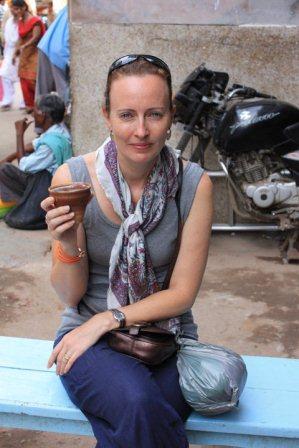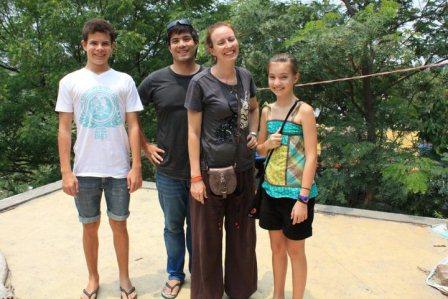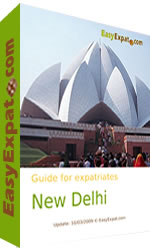From Sydney to Delhi: Life & Lentils
 My name is Louise I am originally from Sydney, Australia and I am currently residing in Delhi with my husband, Ray and my children, Samuel and Hunter. This is my first experience living abroad.
My name is Louise I am originally from Sydney, Australia and I am currently residing in Delhi with my husband, Ray and my children, Samuel and Hunter. This is my first experience living abroad.
1. Why did you move abroad?
Initially my family and I came to Delhi for 3 months when Ray was asked to review a humanitarian project called Sewa Ashram. This project works to rehabilitate Delhi’s destitute and dying through medical intervention, advocacy and skill training. Ray found that he enjoyed the work so much that we are still here 3 years later.
2. How do you make a living?
Bit of this, bit of that really. Humanitarian development work as you can imagine does not pay well. So we have made ends meet through a few side projects. For a while I worked remotely for a herbal medicine company (I am a naturopath) writing copy for websites, brochures and training documents. Now I use my love of shopping to shop for others. A couple of times a year I will hit the Delhi markets and fill my suitcase with all manor of Indian delights. I then head back to Sydney and set up shop at the various weekend markets. Along with this there are often opportunities to give English lessons as well as voiceovers and even staring as extras in movies.
3. How often do you communicate with home and how?
I don’t know if I would have survived as long as I have here without Skype. We would speak to friends and family at least weekly. Facebook has also made it easier to keep in touch with what is going on at home and to live vicariously through friends and family.
I try to blog quite regularly so people back home get more of an insight into the cultural aspects that are so different from Australia and also they can hear a bit more about what we get up to.
4. What's your favorite thing about being an expat in Delhi?
It’s the moments when you find yourself in a place or situation that is so vastly different from home. Like sitting on my scooter at a traffic light wondering if those cows are going to be out of my path by the time the light turns green. Waking in the middle of the night during monsoon and finding a frog on my leg. Being pelted with water balloons when walking to the market in the days leading up to Holi.
5. What’s the worst thing about being an expat in Delhi?
I am an introverted soul; not keen on being the center of attention so I tend to struggle with being the anomaly. Some days I feel like a B-grade celebrity from all the attention I garner. Unlike a lot of other countries, staring at people without reserve is totally acceptable here in India, but I must say I am not a fan. So as not to encourage it I find myself not making eye contact with anyone… Not a good habit once you get back home. I also tend to hide behind sunglasses a lot of the time (sounding more like a B-grade celebrity) but then I think maybe they are not staring because of my being a white female but rather because I am the only person walking around my local market with sunglasses on. Also, I struggle with the lack of personal space. If I am standing in line or in a crowd no you may not rest your hands on my hips!
6. What do you miss most?
Aside from the obvious (being family and friends) it would have to be a good salad. I miss my fresh greens… baby spinach, rocket and even good old iceberg lettuce. It seems that being in Delhi I have missed the new ‘it’ green…Kale? Really?
Actually, it’s not just salad that I miss it’s the variety of foods in general; especially after eating rice and dahl everyday for lunch while living at Sewa Ashram. Don’t get me wrong, Indian food is amazing and so unique but it all has the same flavor undertones. I miss variety… sushi, pasta, hamburgers with beef (which you can get at the American Embassy and your receipt will call it an "Illegal Alien" ), pastries, pestos, baked goods… I could go on.
7. What did you do to meet people and integrate in your new home?
For the first year we lived at Sewa Ashram, which is a fair way out of central Delhi. We lived here with the patients and with a few other foreign volunteers from New Zealand and Germany. Living in such close quarters we forged very strong lifelong friendships very quickly.
We also met people through various groups and organizations such a homeschool groups, sporting activities for the kids at the American Embassy and Churches. From there the network of friends just grew.
8. What custom/ habits do you find most strange about your adopted culture?
Generally people here would rather lie to you than say ‘no’ or admit that they don’t know the answer. Apparently they feel that giving me the answer I want will make me happy and they don’t want to disappoint. Never mind that I will be frustrated and perhaps angry (yes there was an incident or two when I lost my temper) when I find out I have been given wrong directions or something is not going to be ready when expected.
9. What is a myth about your adopted country?
Indian leadership and educated Indians have projected an embellished image of India and Indians that they know to be untrue and have encouraged foreign observers to accept it. This is so much so that they have become convinced in their own mind that this projected image is true. They have projected an image of what they think India ‘ought’ to be rather than what it ‘is’. This is not unique to India a lot of societies perceive themselves incorrectly.
The projected Indian image is not entirely based on fiction. Every myth is based on a kernel of truth. The Indian myth creates unity yet it also deceives the people.
You might be surprised to learn that Indian culture is incredibly materialistic, even their spiritualism is often motivated by wanting divine support for power and money.
10. What advice would you give other expats?
Get a good understanding of the culture so that when there are clashes you can have an alternate perspective. I think one of the best ways to do this is to find a good unbiased book written by a local who also has a well-rounded worldview. This may take a bit of searching as many a local author may have a rather romantic view of their culture and in the case of India may continue to perpetuate a lot of the myths about the culture which are simply not true.
For me the book that opened my eyes was Being Indian by Pavan K Varma.
11. When and why did you start your blog?
I started my blog at the end of 2008 as we were about to leave for our three-month contract in India. It started out as a journal for me and to keep friends and family back home up to date with what we were doing and experiencing. Since then the blog has evolved a lot. I now do less of the journal style posts and more on my observations of what goes on in India. My style is conversational with a bit of dry humor.
12. How has the blog been beneficial?
For me it has been beneficial to preserve my memories. But I often have feedback from new expats to Delhi and those about to relocate to Delhi who appreciate my insights and ask further questions. I have also started a few pages on my blog to hopefully benefit other expats and even locals. One is called Delhi favorites, which suggests services that have made life here that much easier. I have also started a page called Delhi Eats telling of some of my favorite places to eat about town.

Louise's blog, Life & Lentils

Find out more about being an expat in India with Easy Expat's
Part of the EasyExpat.com adventure since 2008. Drink, Travel, Write